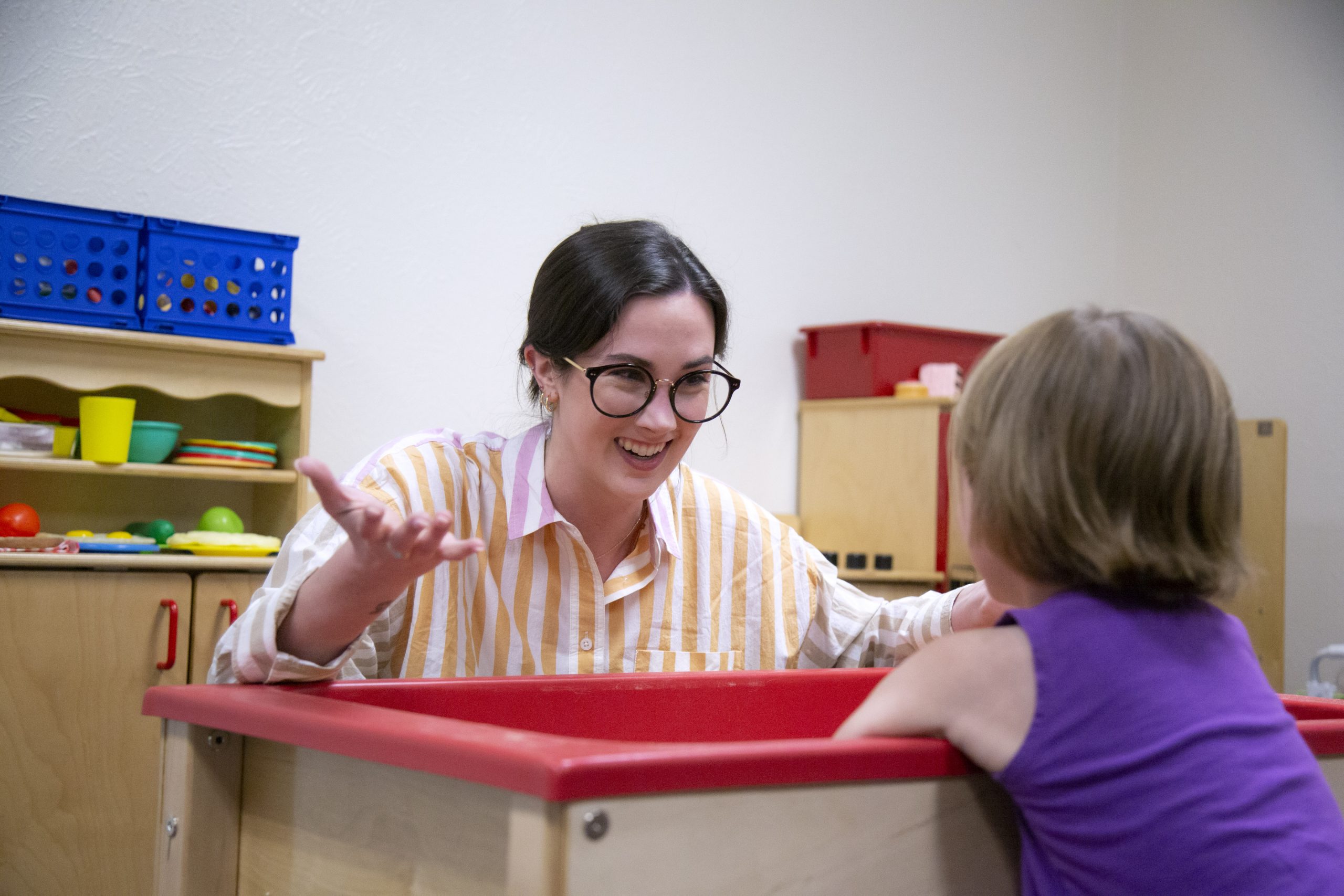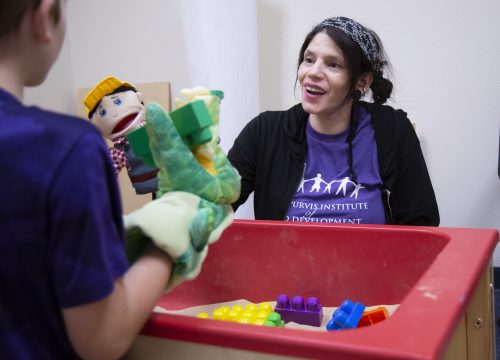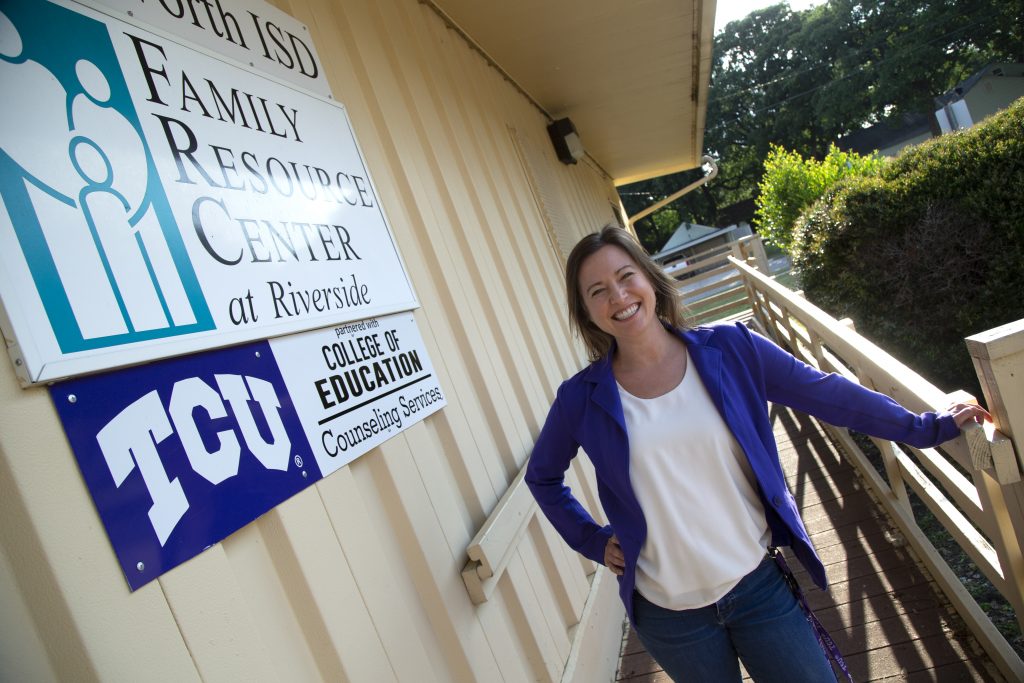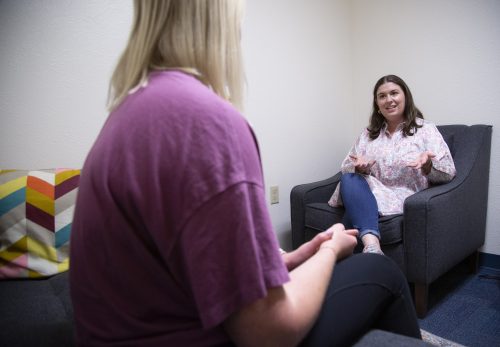Someone to Listen
TCU students counsel children and adolescents through a partnership with Fort Worth schools.


A partnership between TCU and the Fort Worth Independent School District allows students like Mattie Davis to work with young children who need counseling. Photo by Joyce Marshall.
Someone to Listen
TCU students counsel children and adolescents through a partnership with Fort Worth schools.
Chaneera Francis ’05 (MEd ’22) had more than 15 years of teaching experience when she first sat in Fort Worth’s Amon Carter-Riverside High School, listening to teen and tween counseling clients.
A longtime kindergarten teacher in the Mansfield Independent School District in suburban Fort Worth, Francis returned to TCU to pursue a Master of Education in counseling. In 2021, she joined the first class of TCU counseling students working at the Riverside Family Resource Center.
At first she worried that she might struggle to relate to the adolescents assigned to her, but by year two Francis said she was in her element. “Being present is the key.”
Working Together
The Riverside clinic, under the direction of Emily Michero ’05 MEd, assistant professor of professional practice in the College of Education, is one of the Fort Worth Independent School District’s four Family Resource Centers, an effort launched in 1999. The mission is to assist the district’s nearly 75,000 students and their families by offering free or low-cost behavioral health services, including individual, family and group counseling as well as psychiatric and psychological evaluation.
The location of the Riverside clinic, which is adjacent to both Carter-Riverside High School and Riverside Middle School northwest of downtown Fort Worth, reduces transportation barriers; more than half of the clinic’s clients walk there during the school day or after class.
Last year, the Riverside Family Resource Center received about 4,000 referrals, said Ottis Goodwin, director of family and community resources for the school district. Most of those students come from low-income families and either lack insurance or are on Medicaid. Goodwin said it’s a challenge to meet the need for providers; some clients are referred to counselors outside the center.
A $1.2 million grant from an anonymous donor in spring 2021 funded an innovative partnership between TCU and the Fort Worth public school district. That fall, TCU graduate students began providing counseling services at the Riverside Family Resource Center at no cost to the families, joining agencies like ACH Child and Family Services and the Art Station in increasing the center’s capacity to see clients.

TCU graduate students, including Carla Ayala, have scheduled more than 1,800 counseling sessions since TCU’s involvement with the Riverside Family Resource Center began. Photo by Joyce Marshall
By fall 2022, 17 TCU master’s students were seeing clients at the center.
At the secondary level, school counselors spend most of their days arranging class schedules, offering advice on college applications and working with administrators when students exhibit problematic behaviors.
“The clinic counselors do more treatment than a school counselor can do,” said Becky Taylor, a professor of counseling in the College of Education since 1998 and coordinator for counseling practicum/internship. Taylor has long had the professional goal of starting a counseling clinic to serve as a training ground for TCU students. She believes her graduate students have benefited from their experiences at Riverside while also helping meet a need in the community.
To earn a master’s, counseling students need 120 hours of direct, one-on-one counseling with clients. They also must accrue 180 hours of indirect contact, which could consist of writing progress notes on a visit, prepping for a session or reading something related to the field.
“This opportunity really enriches our students,” Taylor said. “Emily Michero knows when [counseling students] get stuck and can help, but the students also learn to take care of themselves. The counseling center has made TCU’s robust program even stronger.”
In public schools, students who experience anxiety or depression or who face ongoing issues at home may fall through the cracks, especially during a time when mental health issues among youth have skyrocketed, accelerated by the challenges of Covid-19.
In a statement released in October 2021, the American Academy of Pediatrics, American Academy of Child Adolescent Psychiatry and the Children’s Hospital Association declared a state of emergency in child and adolescent mental health. In addition to the pandemic, they cited “the ongoing struggle for racial justice” in accelerating trends already seen before 2020.
The suicide rate for 10- to 24-year-olds, they noted, steadily grew from 2010 to 2020. In 2018, suicide became the second leading cause of death for that demographic.
These groups are pushing for the increased “implementation and sustainable funding of effective models of school-based mental health care.” In the joint statement, they also called on policymakers and children’s advocates to take other steps like additional federal funding for evidence-based mental health screenings, diagnosis and treatment.
TCU’s involvement at the Riverside Family Resource Center dovetails with these objectives. “This is the next level of care,” Taylor said. “We can make an impact while seeing clients over a long period of time.”
“Some communities had access to telehealth and tele-counseling that could help children mitigate the stresses happening around them, but other communities didn’t have the same opportunities,” said Frank Hernandez, dean of TCU’s College of Education. “We were thrilled that someone could see this need in the community and were absolutely delighted that this gift came to us.
“The children of Fort Worth deserve that kind of support.”

Emily Michero, an assistant professor of professional practice at the College of Education, was selected in 2021 as the director of the Riverside Family Resource Center. Photo by Joyce Marshall
Vision in Action
Since TCU’s involvement with the center began, graduate student counselors have scheduled more than 1,800 counseling sessions. Each counselor gets a caseload of four clients. Client attendance for these sessions hovered around 76 percent, which, Michero said, is very high for community health.
“In this partnership with the Fort Worth ISD, we have invested money into improving the clinic and creating everything that we think was necessary to make it a training clinic. That includes cameras and computers, which give the students the ability to watch their own sessions afterward,” Michero said. “It also lets me supervise them live.”
Clients whom the counselors-in-training see can range in age from 5 to 18 and have diverse backgrounds. Almost 65 percent of students in the district identify as Hispanic. One barrier to service that Michero hopes someday to address is that none of her counseling students have been fluent in Spanish.
School counselors, principals and teachers refer children to the clinic. Parents also ask for services and students can self-refer. Though clinic visits are split almost evenly along gender lines, more girls than boys refer themselves, Michero said.

Hayley Waring and other TCU graduate students working at the Riverside Family Resource Center have seen clients anywhere in age from 5 to 18. Almost 65 percent of the district’s students identify as Hispanic. Photo by Joyce Marshall.
When she receives a clinic referral, Zurisadai Benitez, who manages the Riverside Family Resource Center for Fort Worth ISD, meets first with parents.
“We have parents who are forthcoming and want the help or sought the help themselves, but we also have parents who are hesitant, scared or have a stigma about mental health,” Benitez said.
The 46 clients seen by TCU counselors-in-training during spring 2022 experienced a range of concerns. Data that Michero and her team gathered showed that 22 of them struggled with grief.
“I can’t even count how many parent and grandparent Covid deaths we’ve had,” Michero said. “There are the obvious family stressors but the economic stressors for a lot of our kids trickle down. The pandemic has magnified everything.”
The counselors also worked with clients on aggression, anger, anxiety, depression, self-harm, school-related problems and suicidal ideation. If a student is deemed in imminent danger of self-harm, he or she is referred for an assessment to Cook Children’s Medical Center or John Peter Smith Hospital in Fort Worth, depending on their age.
Michero sees the impact TCU counselors are making, one kid at a time.
She described watching a child come into a session with exaggerated swagger. “Then he goes into a session and is just this tender, authentic, weeping kid. That sort of thing is incredible.”
Michero said that student, like so many others, benefited from having a caring adult listen without judgment to his problems, worries and fears. She added that takeaways from the sessions can last a lifetime.
Making a Difference
By spring 2023, the TCU counselors’ caseload expanded to 65 clients, which taps the upper limit of the resources the clinic’s 17 counseling students can provide. Though everyone involved seems to wish the program could help more children, they are also buoyed by the knowledge that they’re providing quality services to those they counsel.
“For the new counselors, we try to give them students who need basic counseling with more common issues,” Goodwin said. “In the last two years, we’ve seen a big increase in anxiety and depression.”
“The stress and trauma we’re seeing can be really high, and most of these students haven’t had access to mental health services before now,” said TCU counseling student Lara Schmid ’01 (MEd ’22). “Our role is to individualize our overall approach to counseling and to facilitate the clients’ learning to manage whatever is going on in their lives.”
Schmid, who taught middle school science most recently in Arlington, was taken aback at her own level of anxiety in advance of her first counseling session in early 2022.
“Here I’d taught for 12 years but the idea of being in a room with a person made me more nervous than I ever was standing in front of a classroom,” she said. “The stakes felt high.”
Those fears dissipated thanks in large part to the support and encouragement of Michero. Schmid, who enrolled in the counseling program at TCU in 2019, discovered that she loved play therapy.
Often the youngest children seen at the center won’t dialogue in the traditional way, something that comes far more naturally for adolescents. Instead, the center houses several small rooms filled with toys. A counselor might work on a puzzle alongside a child or perhaps counselor and client will grab crayons and paper to draw. Conversation often flows as a result.
“I tell my students there are 9,000 things you can say that are helpful,” Michero said. “The bottom line is I hope I encourage my students to be authentic and to trust themselves.”

Your comments are welcome
Comments
Related reading:
Features
Imagining Breakthroughs
Future doctors design solutions to health care challenges in a groundbreaking program.
Features
A Lasting Legacy
The name of the Anne Burnett Marion School of Medicine at Texas Christian University honors longtime TCU benefactors.
Features
Groundbreaking Graduates
TCU’s first class of medical students takes innovative training into next steps as doctors.